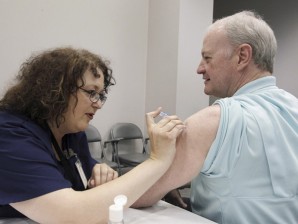New York declares flu emergency

In this file photo taken Oct. 17, 2012, Bill Staples, a Mississippi Department of Health employee, is given a flu vaccine shot by registered nurse Rosemary Jones, also with the health department, in Jackson, Miss. AP FILE PHOTO
NEW YORK – New York’s governor declared a health emergency Saturday over a flu epidemic that has sickened more than 19,000 people, allowing pharmacists to immunize infants and children.
Governor Andrew Cuomo’s move comes amid a nationwide epidemic expected to last several weeks.
There have been at least 28,747 cases reported across the country so far this season, and 20 children have died from the flu, according to the Centers for Disease Control and Prevention (CDC). However, the true number of cases is likely far higher as many who fall ill do not go to the doctor to get tested.
In hopes of curbing the spread of the potentially lethal virus, Cuomo said it was critical to suspend, for the next 30 days, a legal limit that usually only allows New York pharmacists to administer flu vaccines to patients 18 years of age or older.
“We are experiencing the worst flu season since at least 2009, and influenza activity in New York State is widespread, with cases reported in all 57 counties and all five boroughs of New York City,” Cuomo said in a statement.
Article continues after this advertisement“Therefore, I have directed my administration, the state health department and others to marshal all needed resources to address this public health emergency and remove all barriers to ensure that all New Yorkers — children and adults alike — have access to critically needed flu vaccines.”
Article continues after this advertisementIn New York state alone, 19,128 cases have been confirmed this season, a jump from the total of 4,404 during the 2011-2012 flu season.
In order to facilitate access to flu shots, the New York Health Department is also launching a large-scale campaign promoting flu immunization through the media, dedicated websites and social media sites such as Facebook and Twitter.
Urging non-immunized New Yorkers to schedule a flu shot “immediately,” Cuomo reminded them that “it is NOT too late to get a vaccination.”
The governor stressed that relatives and caregivers who regularly come into contact with young children or people at high risk should get a shot against the flu virus, which can spread through coughing or sneezing.
The virus poses an increased risk for infants and toddlers under the age of two, people over 50, pregnant women and those with weakened immune systems or chronic medical conditions.
Flu strikes every year across the United States, bringing chills, sore throats, fever, coughing and achy misery to millions.
The number of annual deaths has ranged from a low of 3,000 to a high of 49,000 since 1976, according to the CDC.
Most of those deaths were among people aged 65 and older.